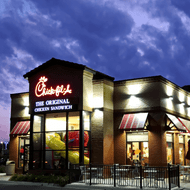Chick-fil-A's Sunday Closure Policy: A Crossroad of Faith, Business Ethics, and Government Intervention
Posted by Emma on 24th Dec 2023
Chick-fil-A, the prominent Atlanta-based fast-food chain known for its chicken sandwiches and Christian values, stands at a crossroads due to proposed legislation in New York. This bill, currently under consideration by the New York Assembly, mandates that food businesses operating at rest stops along Interstate 90 remain open on Sundays. This proposed law poses a direct challenge to Chick-fil-A's longstanding tradition of Sunday closures, a practice deeply rooted in the Christian faith of its founder, Truett S. Cathy.
 v343790, CC BY 3.0, via Wikimedia Commons
v343790, CC BY 3.0, via Wikimedia Commons
At the heart of this issue lies Chick-fil-A's religiously motivated business decision to close all its outlets on Sundays, a policy instituted since its inception in 1946. Truett S. Cathy, a devout Christian, believed in dedicating Sundays to rest and worship, a principle he integrated into his business model. This practice has become a hallmark of Chick-fil-A's corporate identity, symbolising its commitment to faith over profit. However, the New York State Assembly's bill threatens this tradition. The bill aims to ensure continuous service at rest stops, crucial for travellers, by requiring all food establishments, including Chick-fil-A, to operate seven days a week.
The bill has sparked a heated debate among business owners, legal experts, and the public. Some, like New York Assemblymember Tony Simone, advocate for the bill, arguing that service areas, especially those on busy highways, should cater to the needs of travellers every day of the week. Simone, an LGBT rights advocate, also notes Chick-fil-A's controversial history regarding LGBT issues, suggesting that the bill could serve as a form of indirect censure.
Contrastingly, Chick-fil-A's supporters and religious freedom advocates view this legislative move as an infringement on religious liberty and a dangerous precedent for government overreach into private business practices. They argue that forcing Chick-fil-A to operate on Sundays violates the company's religious convictions and raises moral and legal questions about the extent of government authority in dictating business operations.
This situation is not unique in the realm of American jurisprudence. Recent U.S. Supreme Court decisions have shown a trend toward protecting religious freedoms in the business sector. These include rulings favouring individuals and businesses defending their religious-based operational choices, setting a potential legal foundation for Chick-fil-A to challenge the New York bill.
 Mark Turnauckas, CC BY-SA 3.0, via Wikimedia Commons
Mark Turnauckas, CC BY-SA 3.0, via Wikimedia Commons
Parallel to this domestic challenge, Chick-fil-A plans to expand into the U.K. market in 2025, marking its first permanent venture outside North America. This expansion brings additional complexities, as the chain will need to navigate different cultural and legal landscapes, particularly in light of its past controversies over LGBTQ issues and its religious operational policies.
Should a government be able to tell a business when to open and close? Leave your comments below.

